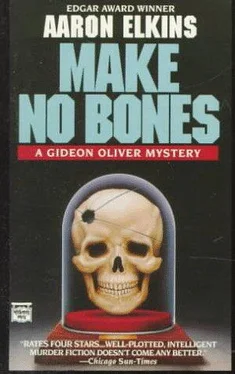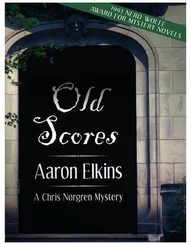Aaron Elkins - Make No Bones
Здесь есть возможность читать онлайн «Aaron Elkins - Make No Bones» весь текст электронной книги совершенно бесплатно (целиком полную версию без сокращений). В некоторых случаях можно слушать аудио, скачать через торрент в формате fb2 и присутствует краткое содержание. Жанр: Классический детектив, на английском языке. Описание произведения, (предисловие) а так же отзывы посетителей доступны на портале библиотеки ЛибКат.
- Название:Make No Bones
- Автор:
- Жанр:
- Год:неизвестен
- ISBN:нет данных
- Рейтинг книги:5 / 5. Голосов: 1
-
Избранное:Добавить в избранное
- Отзывы:
-
Ваша оценка:
- 100
- 1
- 2
- 3
- 4
- 5
Make No Bones: краткое содержание, описание и аннотация
Предлагаем к чтению аннотацию, описание, краткое содержание или предисловие (зависит от того, что написал сам автор книги «Make No Bones»). Если вы не нашли необходимую информацию о книге — напишите в комментариях, мы постараемся отыскать её.
Make No Bones — читать онлайн бесплатно полную книгу (весь текст) целиком
Ниже представлен текст книги, разбитый по страницам. Система сохранения места последней прочитанной страницы, позволяет с удобством читать онлайн бесплатно книгу «Make No Bones», без необходимости каждый раз заново искать на чём Вы остановились. Поставьте закладку, и сможете в любой момент перейти на страницу, на которой закончили чтение.
Интервал:
Закладка:
“Yeah, I know,” John said slowly. “Far be it from me to argue with causal sequence, Doc, but I think Julie’s got something there.”
She smiled at him. “Why, thank you, John.”
And maybe she did. Julie had a way of spotting connections that other people missed. it had happened enough times before.
“There might be something else worth thinking about, John,” Gideon said heavily. He might as well get it out. “I know Nellie fairly well by now, and I get the impression he’s holding something back.”
“Huh? Twenty minutes ago you were vouching for him.”
“I’m still vouching for him. I don’t think he’s killed anybody, I just think he’s-look, Honeyman asked him if everybody got along at the 1981 meeting, and he said yes, but I got the feeling that he was-well, holding something back.”
“What makes you think so?”
Gideon shrugged. “It was just in the air. A feeling. You’d have to know him.”
John looked understandably doubtful.
Gideon banged his mug down, suddenly nettled. “Look, John, I’m just telling you the impression I got. If you want to follow it up, fine. If you don’t want to follow it up, fine. All right?”
John glanced at Julie. “What’s with him?”
“Nothing’s with me. Come on, let’s get out of here.” He swiped irritably at the check and turned it over. “Twenty-six dollars.”
John looked at Julie. “Did I say something to make him mad, or did you say something to make him mad?”
“Oh, he’s not mad at us,” Julie said, and then looked at Gideon with a smile. “He’s feeling like a rat, that’s all. These people are his friends, and he feels like a traitor to his own kind. We’re just getting the brunt of it.” She touched the back of Gideon’s hand. “Not that I’d want you any other way.”
Gideon reacted with silence and mixed feelings. It was damned irritating to have someone who knew what you were feeling before you did. On the other hand, if you were going to feel like a rat anyway, it was nice to have Julie there to understand.
“That’s about it,” he said gruffly, and squeezed her hand in return.
On the short drive back to the lodge, John chuckled to himself in the back seat. “Hey, guess what Applewhite said when I talked to him about this on the telephone.”
Gideon thought for a second. “He said: ‘I bet that sonofabitch Gideon Oliver is mixed up in this somewhere. John grinned. “You got it. Or words to that effect.”
The evening session was held in Whitebark Lodge’s meeting room, where the folding tables had been stowed along the walls and the seats arranged auditorium-style. Once at the lectern and into his subject, Nellie recovered all of his customary verve. His description of the skeleton was precise and dramatic, his account of the cause-of-death analysis-for which he gave Gideon generous credit-was detailed and suspenseful, if not altogether accurate in its minor points. (“Gideon looked at me. I looked at Gideon. What, we wondered, could have caused these bewildering little fractures? Our eyes met above that small, puzzling vertebra. ‘Garrote,’ we both whispered at the same time, as the grim implications…”)
His audience, so engrossed that they forgot to fidget on the uncomfortable folding chairs, consisted of the forty-some-odd anthropologists and students. The spouses, et al., had long ago had their fill of the new skeleton and had found other things to do, as was attested by the clacking of Ping-Pong balls and bleeping of video games from the recreation room next door. The only “outsiders” at the session were Julie and John, sitting with Gideon in a row of seats placed along one of the walls, and Frieda Hobert, occupying pride of place on the aisle in the first row.
The news about Chuck Salish created the expected stir, and when it was noticed that John was in the room, there was a flurry of questions: “Did the police think it was Salish?” “Was there any idea as to the motive for the killing?” “Were there any promising leads?”
“Hard to say,” John answered from his seat. Lieutenant Honeyman had barely gotten started. There were records to look at, people to talk to.
“Are you involved in the investigation?” Leland wondered. “I ask because you seem to be privy to the lieutenant’s plans.”
“I guess you could say that,” John said. “The lieutenant sort of asked me to sit in. He figured, since I’m here anyway, I could be a go-between between the department and you folks. Sort of what I’m doing right now.”
“I see,” Leland said stiffly. “And tell me this, please. Are those of us who were here at the time to consider ourselves under suspicion?”
The underlying hum of whispered conversation stopped as suddenly as if someone had turned off a tap.
“I ask only out of idle curiosity, you understand,” Leland said.
There were a few uncertain laughs, along with a head-thrown-back guffaw from Les Zenkovich.
“Let’s make sure we know who’s dead first,” John said. “Then we’ll think about who killed him.”
“I see. So your decision to remove the skeleton to the safety of the sheriff’s office is not to be taken personally?” “By who?” John said pleasantly.
Leland made a small movement with his mouth and turned in his seat to face the front again.
One of the students raised a deferential hand. “Had anybody thought about making a facial reconstruction from the skull of the dead man? Couldn’t that confirm the identification?”
There was a murmur of interest, mostly from other students.
Nellie, who was still moderating from the front of the room, made a face. “I doubt it, but why don’t we ask our resident expert? Gideon, what do you think?”
Gideon started, caught by surprise. “Uh-well, I’m not really an expert-”
“Watch out now,” Nellie said with a wink, something he could actually manage without being arch, “you’re under oath.”
Gideon laughed. “Seriously, I am not an expert.”
Seriously, he wasn’t. The science-or art; the issue was up in the air-of using modeling clay to build up a facial likeness directly on a human skull had few expert practitioners. There were perhaps two dozen in the United States, some of them anthropologists and some artists, often working together. None of them, however, was here at the meeting, and Gideon was. Two years before, he had attended a week-long workshop on the technique and had found he had a knack for it.
But he’d also found out how unobservant he’d been all his life. He’d had to learn, almost as if he’d never seen them, the way an eyelid was shaped, and an upper lip, and how people’s ears were set into their heads. But he’d stuck with it, and since then he had used it in four cases; and although no one would ever confuse his work with an artist’s, he’d been reasonably successful. Three of the four reconstructions had led to positive identifications, which put him well ahead of the national average.
Among professional anthropologists, the practice had as many scoffers as true believers, with Gideon somewhere in the middle. It was, as far as he was concerned, a helpful tool if used discriminatingly, by people who knew what they were doing, with full appreciation of its limitations. His own three-for-four batting average he put down to some extremely lucky breaks. One of the cases had been a woman with an easily recognizable bony hump on the bridge of her nose, another had had eyes set extraordinarily far apart, and a third had been a man with a jaw like Benito Mussolini’s (that one, for better or worse, had gotten national media coverage). But the fourth had been just an everyday sort of skull, with no particularly distinctive features. And of course that was the one that was still sitting in a box in the King County Medical Examiner’s Office in Seattle, unidentified.
Читать дальшеИнтервал:
Закладка:
Похожие книги на «Make No Bones»
Представляем Вашему вниманию похожие книги на «Make No Bones» списком для выбора. Мы отобрали схожую по названию и смыслу литературу в надежде предоставить читателям больше вариантов отыскать новые, интересные, ещё непрочитанные произведения.
Обсуждение, отзывы о книге «Make No Bones» и просто собственные мнения читателей. Оставьте ваши комментарии, напишите, что Вы думаете о произведении, его смысле или главных героях. Укажите что конкретно понравилось, а что нет, и почему Вы так считаете.












